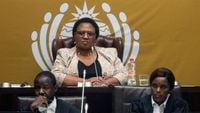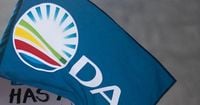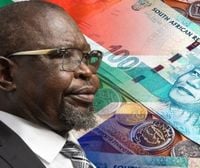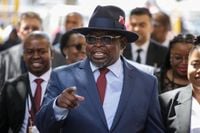South Africa is facing two significant economic challenges on Wednesday, April 2, 2025. As parliament prepares to vote on the contentious 2025 Budget, uncertainty looms over the outcome, which could have far-reaching implications for the country’s coalition government. At the same time, U.S. President Donald Trump is expected to announce global tariffs that may adversely affect South Africa's economy.
The budget vote is scheduled for 14:00 local time, following the African National Congress (ANC) securing a majority in the Standing Committee on Finance to adopt the budget framework report on Tuesday, April 1. The approval came after ActionSA, a party not part of the Government of National Unity (GNU), voted alongside the ANC to support the framework, albeit with conditions. ActionSA insisted that its recommendations to the National Treasury be included, though these recommendations are not legally binding.
Among the key proposals from ActionSA was the removal of a one percentage point value-added tax (VAT) hike over the next two years. Additionally, the Treasury’s decision not to adjust tax brackets for inflation has given the Finance Minister 30 days to revise the budget. However, this does not constitute an amendment to the budget itself, leaving the framework ultimately approved as-is.
The Democratic Alliance (DA) also proposed scrapping the VAT hike and suggested cutting expenditures to balance the budget. However, this approach would have required a formal amendment, which could have delayed the parliamentary vote. The ANC supported ActionSA’s proposal, along with the Inkatha Freedom Party (IFP), allowing the budget framework to proceed to parliament with the VAT and tax hikes intact.
As tensions rise, the DA expressed concern over the ANC’s decision to seek support for the budget from outside the GNU, labeling it a “serious infraction.” The ANC has countered by stating that if the DA does not support the budget, it risks isolating itself from the coalition. Frank Blackmore, lead economist at KPMG South Africa, remarked that the ideal scenario would be for the DA’s proposal to be adopted, which would eliminate VAT hikes and prioritize expenditure cuts. According to Blackmore, focusing on economic growth is essential for the country’s bond and equity markets and for stabilizing the rand.
The rand has already seen significant depreciation, trading at R18.54 to the dollar as markets await the parliamentary outcome. A failure to pass the budget could force the country to revert to the path set by last year’s Medium-Term Budget Policy Statement, which updates revenues but does not align with current strategic objectives.
In a more concerning scenario, the ANC could potentially pass the budget without the DA, relying instead on ActionSA to secure the necessary votes. However, such a move would indicate a lack of collaboration within the GNU and could lead to its collapse, prompting negative reactions from capital markets and further weakening the rand.
Looking beyond South Africa’s internal challenges, the nation is also bracing for external pressures stemming from Trump’s anticipated tariff announcements. Dubbed “Liberation Day,” Trump is expected to unveil a 20% across-the-board tariff on imports. This move poses a significant threat to South Africa, which counts the United States as its second-largest trading partner. The tariffs could severely impact the local economy, particularly given that Trump has already confirmed a 25% tariff on vehicles and vehicle components imported into the U.S.
The Department of Trade, Industry and Competition has warned that these tariffs would override the African Growth and Opportunity Act (AGOA), which currently allows South Africa duty-free access for auto exports. The department noted that auto exports accounted for 64% of South Africa’s shipments to the U.S. under AGOA, with the nation having shipped cars and parts worth R45 billion last year. The automotive sector plays a crucial role in the South African economy, contributing over 5% to the GDP and employing more than 116,000 people.
Amid these tumultuous circumstances, Speaker of the National Assembly Thoko Didiza has rejected requests from multiple parties to delay the vote on the 2025 Fiscal Framework. The DA, Economic Freedom Fighters (EFF), African Transformation Movement (ATM), and the MK Party all claimed that the finance committee failed to meet legal requirements, which led to chaos and calls for suspension during the debates.
Didiza ruled that the debate would proceed, despite the ongoing disputes and legal threats. In a letter addressed to the National Assembly, Didiza stated that the draft report was formally adopted by the Standing Committee and that amendments were considered before the final report was agreed upon. This included a clear statement as required by section 8(4) of the Money Bills and Related Matters Act.
During the heated debate, various members raised points of order, with DA chief whip George Michalakis arguing that the report was incorrect in terms of legislation. He highlighted that the VAT increase would take effect on May 1, 2025, and called for the report to be returned to the committee for further review. ATM leader Vuyolwethu Zungula and EFF MP Omphile Maotwe echoed these sentiments, insisting that the committee must follow the correct processes.
As the parliamentary session unfolds, the stakes are high for South Africa. The outcome of the budget vote will not only determine the country’s financial direction but also test the stability of the GNU amid internal and external pressures. With the rand under strain and the potential for new tariffs looming, the implications of this day will resonate far beyond the walls of parliament.







